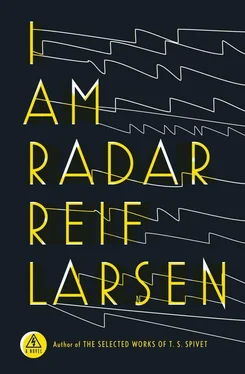“Lars,” he hissed. “The scene, the scene. This is happening now.”
Lars leaped up and disappeared into the container. He emerged with a large piece of canvas in his arms.
“Help me with this, would you?” he called out to Radar.
Radar held one end of the canvas as they unrolled it against the side of the container. Lars went back inside and came out with several spotlights, which he pointed at the scene. He went back in, connected the cords, and then there was light.
Radar gasped. Such was the magic of the theater. They were instantly transported. A valley surrounded by tall, rugged mountains. A cloudless sky. A sun on the verge of setting. A lazy river. This valley was the world now. He could feel the audience shifting, making room for this new truth.
Otik touched the birds’ necks, flicked some switch, and they sprang to life. The crowd murmured as the two birds rose into the air, playing against each other, diving, falling, whirling across the backdrop of mountains. Radar realized there were actually four birds: the two in the air and then their shadows against the backdrop, which were like them but also distinct. The birds’ wings were beating to the rhythm of the drums, and Horeb was watching the birds dive above his head. It was as if he were guiding them with his music, high and low, high and low, each bird to each tone. Or perhaps the birds were guiding him — it was no longer clear who controlled whom. Every single eye in the audience watching every single movement of those two little puppets as they united, separated, drifted, spun, circled, floated, soared, plunged. The two birds bound together in understanding, never far from each other, whispering, talking, laughing: Here we are, here we are, they said, know us if you can.
Radar felt a gear turn in his chest. He knew then what he must do. He ran into the container and fetched one of the transceivers and a speaker. He plugged the speaker into the generator, connected it to the transceiver, and clicked on the radio dial, sweeping the signal across the shortwave frequencies so that scraps of voices, music, static, electricity were scooped from the invisible spectrum and transformed into sound by the radio’s internals. Bits of Kikongo, French, pop music, reggae, hip-hop, sermons, all bleeding in and out from that uncertain fuzz. Radar closed his eyes and spun the dial. That little dial between thumb and finger became an extension of him, its sounds his sounds, its search his search.
At a certain point the radio fell upon the sound of drums, and Radar paused there. Horeb’s drumming mixed with the drumming on the radio, the beats oscillating and intertwining. The birds and their shadows seemed to respond to this doubling — their pace increased, back and forth, back and forth. At one point they crashed into the backdrop, fell, then recovered, flying high above their heads, out of the light of the fire, disappearing into the vast bowl of darkness.
There was a splash. Horeb abruptly stopped drumming. Radar cut off the radio.
He was afraid to look over at Otik, fearing that he would be furious about losing his birds or furious that Radar had ruined the show with his impromptu addition. But when he finally did steal a glance at him, he saw a broad smile stretching across his face.
“Burazeru,” Otik whispered. “I am home again.”
Around them, the crowd was silent. There was no clapping — not that there needed to be, but after such an intimate display of aerial courtship, the silence was a bit unnerving. Slowly, though, Radar understood. They had all paid witness. There was no need to say what was already said.
And then he heard it, faint but nonetheless certain: drumming. At first he assumed it was coming from the radio, which he must not have turned off properly, but then he realized it was coming from the opposite bank. First in one place, then drums all up and down the river, carrying out across the water.
Horeb was sweating, smiling above his drum, the spotlight illuminating him from below.
“They heard the message. They are calling back to us,” said Horeb.
“What are they saying?” said Radar.
Horeb listened. “They are speaking a different language,” he said, closing his eyes. “But I think they say, We see you, we see you, we see you. . He is coming, he is coming, he is coming. ”
Radar was awoken by a great commotion outside. He opened his eyes, his head still lingering in a dream he could not remember. The other cots in the container were already empty. He leaped through the mosquito net, tripped, and ran to the door. Blinking against the morning sun, he saw that the pousser had started to pull the barge out into the river. The docks were crammed full of people waving, crying, shouting, clapping, dancing. Funes was at the stern, holding a book, waving back at them. Radar had to admit, it was nice to have such a send-off, even if the attention technically wasn’t directed at him. He gave an embarrassed wave and then went over to where Horeb, Otik, and Lars stood watching.
“If they think he will bring them better life, they are getting big surprise,” said Otik.
“They want to believe,” said Horeb. “A better life can only come through belief.”
“Belief is for stupid people. I can believe this book will save me with all of my heart, and I will still be majorly fucked.”
“What do you believe in, my friend?” said Horeb. “Why have you come all this way?”
Otik started to answer but was interrupted by a long, withering blast from the boat’s whistle, which scattered the crowd.
The pousser spun the barge around and pointed them upstream. Soon, the town and its crowds of people disappeared around the bend, and just like that, the river and the jungle became the entirety of their existence. A man whom Radar had not seen before was standing at the bow of the boat, holding a long striped pole, which he would dip into the river every five seconds while shouting, “Ah yeah mayee!”
“What’s he doing?” asked Radar.
“He’s measuring the depth of the river,” said Horeb. “Without him, we are in trouble.”
“Ah yeah mayee!” called the man.
As they went on, the constant rhythm of the sounder’s declaration, coupled with the little expert dip and twirl of his canary yellow pole, became the measure of time’s passage. That pole, plumbing the distance between surface and bottom, was the engine of their progress. If the pole stopped twirling, so too would they.
“Ah yeah mayee!”
Professor Funes had retired to his cabin in the pousser and would not emerge for the rest of the day. Radar found this strange, but he did not have long to contemplate his absence, for there was much activity around the container. After the previous night’s performance, both Lars and Otik were visibly excited.
“How did you know to do this?” Otik asked Radar. “With radio signal?”
“Ah, have you met my father?” said Radar. “I grew up with radio signal. I was taking apart radios before I could speak.”
“It is perfect. It is so fucking perfect. It is just what we needed and we did not even know it! Kaprow calls this ‘art of life.’ But we must have many radios. How many do you have?”
“Three.”
“No, it won’t do. It won’t do. We need at least fifty. Maybe eighty.”
“Where are we going to get eighty radios?”
“Was the drumming okay?” Horeb asked
Otik ignored him. “We must rehearse!” he cried. “We must make wagon!”
Otik, now manic, hurled himself around the barge like a loose rhino. He seemed no longer bothered by the fact that they were on a barge, though the river here was decidedly calmer than the open ocean. Together, the four of them pulled the theater wagon out of Moby-Dikt piece by piece and constructed it on the bow of the barge, attaching the top, the wheels, the curtains, the spotlights, the wings, and the scrim. Radar had to admit it was an impressive sight, a sight that beckoned with promises of a show as the river flowed beneath and the lush landscape slowly spun and revolved around them.
Читать дальше












